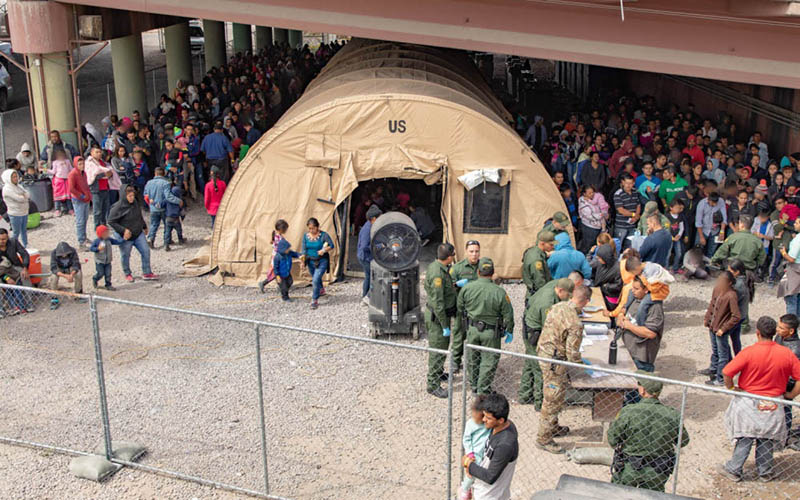
Border Patrol agents process scores of migrants at the border in El Paso, Texas, in this photo from March. Border agencies have said they’re in danger of running out of money for migrant detention facilities if Congress does not act to approve emergency funding. (Photo by Mani Albrecht/U.S. Customs and Border Protection)
WASHINGTON – Arizona representatives split down party lines Tuesday as the House approved $4.5 billion in emergency border funding, setting up a showdown with the Senate which passed its own version of the measure Wednesday.
The votes come as federal officials say they could be just days away from running out of money to handle the surge of migrants at the border.
The House voted 230-195 for its bill that will go toward food, water and medical services for the large number of immigrants being held in detention centers. Democratic leaders added a number of measures to win support from members of their own party, including language requiring upgraded detention facilities and limiting the time children can be held in detention, among other protections.
That won over most Democrats: Just four voted against the bill, and only three Republicans crossed the aisle to support it. None of Arizona’s House members crossed party lines for the vote.
There was no such partisan divide in the Senate, which passed its $4.6 billion bill on an 84-8 vote Wednesday afternoon. Both of Arizona’s senators voted for the measure.
But the Senate bill does not include all of the safeguards for detainees of the House bill, which does not have the funding for immigration judges and military operations of the Senate version.
House Republicans pointed to the bipartisan Senate bill, saying the House measure “lacks funding in critical areas” and “abandons” law enforcement officers.
But Democrats said the House bill confronts the humanitarian crisis without aiding the Trump administration in its “cruel policies.”
“Trump’s cruel policies have manufactured a crisis at the border and desperate asylum-seeking children and parents are paying the price,” Rep. Raul Grijalva, D-Tucson, said in a statement Tuesday. “He is not concerned with how many children live in squalor as long as it serves his twisted political agenda.”
Just under two-thirds of the funding in the House bill would go toward the Department of Health and Human Services, which is responsible for housing migrant children after they are apprehended or turn themselves in at the border. About a third would to go the Department of Homeland Security, with the rest going to the Justice Department.
“This bill lacks funding in critical areas and imposes unreasonable restrictions on the Department of Homeland Security,” Rep. Debbie Lesko, R-Peoria, said in a statement after the vote. She accused Democrats of playing politics with a “desperately needed” humanitarian package instead of a bill that has a chance of winning final approval and being signed by the president.
Rep. Andy Biggs, R-Gilbert, called the House bill “irresponsible legislation” that “encourages rampant lawlessness” by not providing more funding for law enforcement at the southern border that he says is “short-staffed” and “under-equipped.”
“We are abandoning our Border Patrol and ICE agents and innocent Americans around the country who are affected by this crisis,” Biggs said. “We are sacrificing our safety and sovereignty to please the open-borders special interests.”
Speaker Nancy Pelosi had earlier said that the House “legislation protects families” rather than funding the “administration’s failed mass detention policy,” adding that the alternatives have a successful track history.
She said the House bill places strict limits on influx shelters, protects sponsors from DHS immigration enforcement based on information collected by HHS during the vetting process and creates strong oversight by Congress.
Grijalva said the bill was the best possible under the circumstances.
“While this legislation is not perfect, I’m hopeful that this funding will direct resources to the border so that asylum-seeking children and families are treated with the humanity and dignity they deserve,” he said.
But the House and Senate bills still need to be reconciled, with Congress scheduled to leave town next week on a Fourth of July recess. Senate Majority Leader Mitch McConnell announced after Wednesday’s vote that senators should expect to be in town Friday for votes on a compromise.
Even then, however, there is no guarantee the funding bill will be signed by President Donald Trump. The White House this week threatened a veto because of the “partisan provisions designed to hamstring the Administration’s border enforcement effort.”